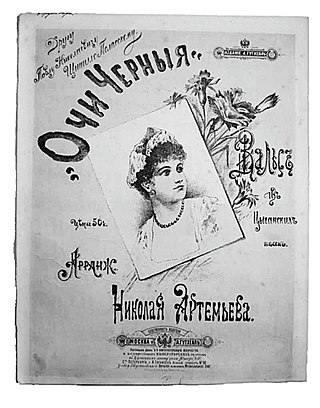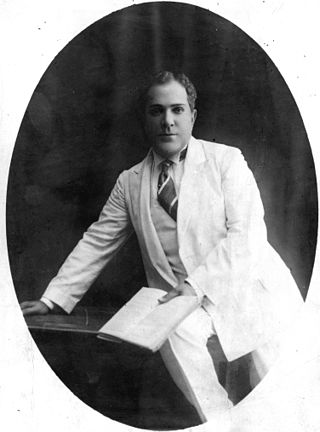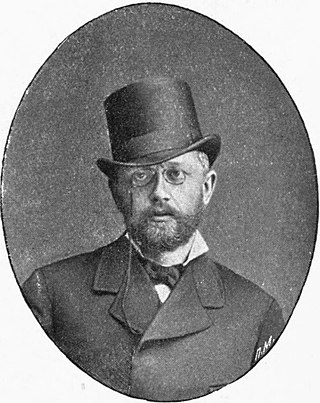
Pyotr Ilyich Tchaikovsky was a Russian composer during the Romantic period. He was the first Russian composer whose music would make a lasting impression internationally. Tchaikovsky wrote some of the most popular concert and theatrical music in the current classical repertoire, including the ballets Swan Lake and The Nutcracker, the 1812 Overture, his First Piano Concerto, Violin Concerto, the Romeo and Juliet Overture-Fantasy, several symphonies, and the opera Eugene Onegin.

The Year 1812, Solemn Overture, Op. 49, popularly known as the 1812 Overture, is a concert overture in E♭ major written in 1880 by Russian composer Pyotr Ilyich Tchaikovsky. The piece commemorates Russia's successful defense against the French invasion of the nation in 1812.

Karl Yulievich Davydov was a Russian cellist, described by Pyotr Ilyich Tchaikovsky as the "czar of cellists". He was also a composer, mainly for the cello. His name also appears in various different spellings: Davydov, Davidoff, Davidov, and more, with his first name sometimes written as Charles or Carl.

Feodor Ivanovich Chaliapin was a Russian opera singer. Possessing a deep and expressive bass voice, he enjoyed an important international career at major opera houses and is often credited with establishing the tradition of naturalistic acting in his chosen art form.

The "Song of the Volga Boatmen" is a well-known traditional Russian song collected by Mily Balakirev and published in his book of folk songs in 1866. It was sung by burlaks, or barge-haulers, on the Volga River. Balakirev published it with only one verse. The other two verses were added at a later date. Ilya Repin's famous painting Barge Haulers on the Volga depicts such burlaks in Tsarist Russia toiling along the Volga.

Fyodor Ignatyevich Stravinsky, 20 June [O.S. 8 June] 1843, estate Novy Dvor (Aleksichi), Rechitsky Uyezd, Minsk Governorate – 4 December [O.S. 21 November] 1902) was a Russian bass opera singer and actor. He was the father of Igor Stravinsky and the grandfather of Théodore Strawinsky and Soulima Stravinsky.

Alexander Ilyich Siloti was a Russian virtuoso pianist, conductor, and composer.

"Dark Eyes" is a well-known and popular Russian romance. The lyrics were written by the poet and writer Yevhen Hrebinka and first published on 17 January 1843. The melody associated with the lyrics has been borrowed from the "Valse hommage", Op. 21 for piano, written by Florian Hermann and published in 1879.
The Liturgy of St. John Chrysostom is an a cappella choral composition by Pyotr Ilyich Tchaikovsky, his Op. 41, composed in 1878. It consists of settings of texts taken from the Divine Liturgy of St. John Chrysostom, the most celebrated of the eucharistic services of the Eastern Orthodox Church. Tchaikovsky's setting constitutes the first "unified musical cycle" of the liturgy.

Yevgeny Yevgenievich Nesterenko was a Soviet and Russian operatic bass. He made an international career, based at the Bolshoi Theatre. He performed a vast repertoire of 50 leading roles, and was known for the title role of Mussorgsky's Boris Godunov. He was active in concert, and composers wrote music for him such as Suite on Verses of Michelangelo by Dmitri Shostakovich. He was a teacher at Moscow Conservatory and the Music and Arts University of the City of Vienna.

Désirée Artôt was a Belgian soprano, who was famed in German and Italian opera and sang mainly in Germany. In 1868 she was engaged, briefly, to Pyotr Ilyich Tchaikovsky, who may have coded her name into works such as his First Piano Concerto and the Romeo and Juliet Fantasy-Overture. After her 1869 marriage to the Spanish baritone Mariano Padilla y Ramos, she was known as Désirée Artôt de Padilla or Désirée Artôt-Padilla.

Nikolay Figner (1857–1918), lyric tenor, and Medea Figner (1859–1952), mezzo-soprano, later soprano, were a husband-and-wife team of opera singers active in Russia between 1889 and 1904. Medea was Italian-born but she became completely Russianized after marrying Nikolay. They had separate careers before their wedding, and again after their divorce in 1904, but during the 15 years of their marriage they almost always sang in the same performances. They created the main tenor and soprano roles in two operas by Pyotr Ilyich Tchaikovsky – The Queen of Spades and Iolanta – and appeared in a number of other important Russian musical premieres.

Pyotr Ivanovich Slovtsov was a famous Russian tenor.

Fyodor Petrovich Komissarzhevsky was a Russian opera singer and teacher of voice and stagecraft. A leading tenor at the Mariinsky Theatre in St. Petersburg, he created many roles in Russian operas, including the Pretender in Mussorgsky's Boris Godunov and the title role in Tchaikovsky's Vakula the Smith. He had a voice described in the Grove Book of Opera Singers as small but with a "velvety timbre" and as a singer was known for not only for his clear diction and beautiful phrasing but also for his skill as an actor. He was the father of the actress Vera Komissarzhevskaya and the director Theodore Komisarjevsky.

Oda Slobodskaya was a Russian soprano who became a British citizen.

Grigory Andreevich Lishin was a poet, theatre critic and composer from the Russian Empire. He composed two operas after texts of Pushkin: Graf Nulin and Tsigane, but was mainly known for his songs.

The opus Six Romances was composed in 1878 by Pyotr Ilyich Tchaikovsky for voice and piano, and was published as Opus 38 later that year. Of these six songs, "Don Juan's Serenade" was the most successful, becoming one of the best-known works among the approximately 100 romances that Tchaikovsky composed during his lifetime.

Prokhor Andreevich Chaliapin is a Russian singer, socialite, media personality and television presenter. Chaliapin first became known as a finalist on the sixth season of the Russian musical reality programme Fabrika Zvyozd.
"Legend", Op. 54, No. 5 is a composition by Pyotr Ilyich Tchaikovsky. Originally written in 1883 as a song for solo voice and piano, it was subsequently arranged by Tchaikovsky for solo voice and orchestra (1884), and then for unaccompanied choir (1889).
















